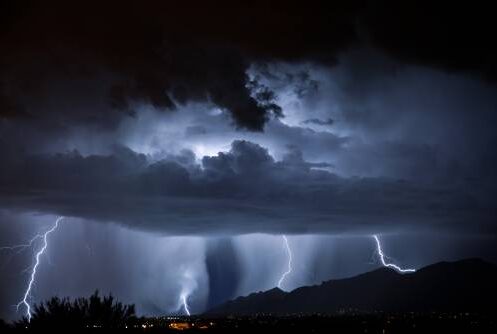A little rain shower may be a welcome break from the usual hot weather in summer. However, severe weather is no laughing matter. Homeowners should prepare for severe weather by knowing how to secure their homes effectively. Preparing your HVAC system for a storm can safeguard your investment and keep you safer.
Make Sure That Your Backyard Is Clear
When a storm looms in the distance, you likely have a lot on your mind. Don’t neglect cleaning up the yard. During a storm, lawn furniture and outdoor toys may all become missiles. They can cause damage to your house or your outdoor AC unit.
When bad weather is coming, make it a habit of putting away anything in the yard that might become airborne. If you want to store big objects outside for the whole season, you should attach them to your deck, patio, or home using some secure fastener. Besides tidying the yard, remove any diseased, broken, or otherwise unhealthy branches from trees. Falling branches can severely damage the AC unit and your home.
Invest in a Quality Surge Protector
Lightning during a storm may cause irreparable damage to heating and cooling equipment and any electrical appliances or gadgets that you may own. A severe power surge has the potential to cause your AC system to fail immediately. Other surges may only lead to a gradual decline over time.
Power strip surge protectors can protect some items but won’t protect larger systems like your air conditioning system. One solution is to have a whole-home surge protector installed. To protect your air conditioning system and other electric devices from surges, have a qualified technician install a surge protector at the circuit breaker box that serves it.
With this, you won’t have to worry about your HVAC system being damaged by lightning strikes. It will protect the heating and cooling system, refrigerator, washing machine, and anything else plugged in. If a storm occurs while you are at work or on vacation in another place, it will protect your property from any harm.
Cover Your Outdoor Unit
The outdoor condenser unit of your AC system is susceptible to all kinds of damage. Storms and hurricanes have the potential to do significant damage to the fins and refrigerant coils. This can result in problems for the whole system.
Covering the exterior unit of your heating and air conditioning system is the best preventative action that you can take to safeguard its components. Installing a hail shield is a good idea too. Hail shields have a robust metal mesh designed to remain in place throughout the year to protect your system. They will not hamper the heating and cooling of your home, and it keeps out leaves, twigs, and other debris that can negatively influence the system’s function while allowing air to flow freely. You can also consider putting a permanent cover over the unit, like a patio roof or pergola, to protect it from falling objects.
Turn Off Your Heating and Air Conditioning System
When you hear that inclement weather is coming, consider turning off your HVAC system using the thermostat and then turning off the electricity at the circuit breaker in your home. This reduces the likelihood of damage caused by power surges from local lightning strikes, broken transformers, or the reconnection of the power supply after a power outage.
If the power goes out before you turn the AC off, be sure to turn it off and shut off power at the breaker. After a power outage, you’ll want to wait before turning the power back on. This will minimize harm from power fluctuations that may occur while the rest of the devices in your house come back up.
But what if you’re not home to turn the power off? That’s another reason to consider having whole-home surge protection installed.
Cover Exposed Wires
Many cases of short-circuiting occur in inclement weather because wires become weaker from exposure to the elements. That’s one reason to consider having regular maintenance performed on the heating and cooling system. During a maintenance visit, the technician will check wires and connections to determine if any need tightening, repair, or replacement. We suggest scheduling maintenance for the spring for the best appointment availability.
Take Precautions Against Strong Winds
Even if high winds don’t qualify as severe weather, they might cause problems for your HVAC system. The leaves, twigs, dirt, and dust blown in by heavy winds might clog your HVAC system’s outside units. This dirt can clog the components of the fans that help keep the unit cool.
A restriction in the airflow can cause the unit to overheat. This will shut down the system and could cause significant damage to the unit. Even if the unit does not overheat, the added strain on the fans and motor can increase energy consumption and additional wear and tear.
One way to prevent debris from accumulating in and on the outdoor unit is by installing fencing. Fencing should be at least 2 feet from the unit. A trellis or similar structure will cost less but will be less secure.
Protect the Unit From Floodwater
Your outdoor AC unit is probably already on a concrete slab. However, taller bases will protect it from flood waters. While most footers are either flush with the ground or a few inches taller, it is possible to have a foundation that is several feet tall. Determine the optimal foundation height by consulting a local HVAC professional. If floodwater covers the unit, be sure to turn off the power immediately.
For further safety, be sure that your gutter system directs downspouts away from your home and AC unit. The terrain surrounding the condenser should slope away from the home for optimal drainage. If you routinely see standing water near the unit, consider consulting a landscaper to improve the drainage.
Trust the Experts
A skilled HVAC technician should check your air conditioner regularly to ensure that it is in excellent operating order. If your unit sustains damage during a storm, it should be thoroughly inspected before you use it again. Storm damage is only sometimes obvious, and it may worsen after the storm has gone. Flooding may harm internal components. High winds could damage the coolant lines and result in a leak. A quick check will tell you whether it’s okay to switch on your air conditioner again.
At Sheldon's Heating & Air Conditioning, we want you to have a long and happy relationship with your air conditioner, so we provide these tips to help you do just that. We also offer installation, repair, and maintenance for heating and cooling systems, including inspections and AC rejuvenation. To keep your system efficient, we offer duct cleaning, sealing, repair, and replacement. We also offer indoor air quality solutions and plumbing services, including 24/7 plumbing repair.
Call Sheldon's Heating & Air Conditioning now for tips on protecting your air conditioning system from storms or for any of our other services.




